Το προπτυχιακό πρόγραμμα σπουδών στο Τεχνολογικό Πανεπιστήμιο Κύπρου είναι βασισμένο στο Ευρωπαϊκό Σύστημα Μεταφοράς και Συσσώρευσης Διδακτικών Μονάδων (ECTS). Για τη συμπλήρωση των προπτυχιακών σπουδών στους τομείς της ηλεκτρολογίας, και της πληροφορικής και μηχανικής υπολογιστών απαιτούνται τουλάχιστο 240 μονάδες ECTS με έναν βαθμό τουλάχιστο 5 από 10 για κάθε μάθημα.
Οι 240 μονάδες ECTS περιλαμβάνουν μάθηση ξένων γλωσσών και βασικά μαθήματα επιστήμης, θεμελιώδη μαθήματα και μαθήματα επιλογής στους τομείς της ηλεκτρολογίας, και της πληροφορικής και μηχανικής υπολογιστών, και την συμπλήρωση εκπαιδευτικού θέματος σε σχεδιασμό και υλοποίηση (πτυχιακή εργασία). Κάθε ακαδημαϊκό έτος αποτελείται από δύο εξάμηνα. Ο αριθμός διδακτικών μονάδων ECTS που διατίθεται σε κάθε ακαδημαϊκό έτος είναι τουλάχιστον 60.
Ένας σπουδαστής/σπουδάστρια πρέπει να επιτύχει γενική βαθμολογία (GPA) 5 ή περισσότερο από τα 10 για σκοπούς αποφοίτησης. Σε περίπτωση αποτυχίας σε ένα μάθημα μπορεί να το επαναλάβει μέχρι 2 φορές εάν ο βαθμός του/της είναι μικρότερος από 5.
Όλοι οι βαθμοί των διαφόρων μαθημάτων καταγράφονται και υπολογίζονται για την εξαγωγή του μέσου όρου γενικής βαθμολογίας. Εάν ένας σπουδαστής δεν συγκεντρώσει γενική βαθμολογία τουλάχιστο 5 από τα 10 μέχρι το τέλος του ογδόου εξαμήνου θα μπορεί να συνεχίσει για τέσσερα επιπλέον εξάμηνα. Εάν μετά από 12 συνολικά εξάμηνα ο σπουδαστής αποτύχει και πάλι, τότε τερματίζεται η φοίτησή του.
Το πρόγραμμα σπουδών οδηγεί στην απόκτηση πτυχίου Ηλεκτρολόγων Μηχανικών ή πτυχίου Πληροφορικής και Μηχανικών Υπολογιστών. Τα μαθήματα διδασκαλίας χωρίζονται στις ακόλουθες κατηγορίες:
- Υποχρεωτικά Μαθήματα Αυτά είναι θεμελιώδη μαθήματα στον κάθε τομέα και αποτελούν τις προϋποθέσεις για την παρακολούθηση σειρών μαθημάτων υψηλότερου επιπέδου. Αυτά τα θεμελιώδη μαθήματα πρέπει να είναι υποχρεωτικά για όλους τους σπουδαστές στο Τμήμα Ηλεκτρολόγων Μηχανικών και Μηχανικών Η/Υ και Πληροφορικής.
- Μαθήματα Επιλογής Αυτά είναι μαθήματα που επιτρέπουν την εστίαση σε μια συγκεκριμένη περιοχή του κάθε τομέα επιλογής.
- Μαθήματα Επιλογής στον ευρύ Τομέα της Μηχανικής Αυτά είναι μαθήματα που βοηθούν τους σπουδαστές να διευρύνουν τις γνώσεις τους στον τομέα επιλογής.
- Ελεύθερα Μαθήματα Επιλογής Μαθήματα στους τομείς κοινωνικών και ανθρωπιστικών σπουδών , διοίκησης επιχειρήσεων, οικονομικών κ.λπ. Ο σκοπός αυτών των μαθημάτων είναι η διεύρυνση των γνώσεων των σπουδαστών πέρα από τα όρια της Μηχανικής, και εστιάζονται σε περιοχές σχετικές με τους επαγγελματικούς τομείς των Ηλεκτρολόγων Μηχανικών και της Πληροφορικής και Μηχανικών Υπολογιστών.
Εκτός από τις πιο πάνω επιλογές κάθε σπουδαστής πρέπει να συμπληρώσει μία εργασία σχεδιασμού και υλοποίησης (πτυχιακή εργασία) κατά τη διάρκεια των δύο τελευταίων εξαμήνων φοίτησης. Το project θα επιτρέψει στους σπουδαστές να εφαρμόσουν τις γνώσεις και δεξιότητές τους δουλεύοντας σε ένα συγκεκριμένο πρόβλημα πρακτικής φύσεως που θα περιλαμβάνει σχεδιασμό, ανάλυση και έλεγχο για ορθή λειτουργία.
Ο κάθε σπουδαστής θα έχει το δικό του ακαδημαϊκό σύμβουλο ο οποίος θα τον καθοδηγεί στην κατάρτιση του κατάλληλου σχεδίου σπουδών με την επιλογή μαθημάτων και το σχεδιασμό κατεύθυνσης σπουδών.
Πρόγραμμα Προπτυχιακών Σπουδών
Το προπτυχιακό πρόγραμμα σπουδών στο Τεχνολογικό Πανεπιστήμιο Κύπρου είναι βασισμένο στο Ευρωπαϊκό Σύστημα Μεταφοράς και Συσσώρευσης Διδακτικών Μονάδων (ECTS). Για τη συμπλήρωση των προπτυχιακών σπουδών στους τομείς της ηλεκτρολογίας, και της πληροφορικής και μηχανικής υπολογιστών απαιτούνται τουλάχιστο 240 μονάδες ECTS με έναν βαθμό τουλάχιστο 5 από 10 για κάθε μάθημα.
Οι 240 μονάδες ECTS περιλαμβάνουν μάθηση ξένων γλωσσών και βασικά μαθήματα επιστήμης, θεμελιώδη μαθήματα και μαθήματα επιλογής στους τομείς της ηλεκτρολογίας, και της πληροφορικής και μηχανικής υπολογιστών, και την συμπλήρωση εκπαιδευτικού θέματος σε σχεδιασμό και υλοποίηση (πτυχιακή εργασία). Κάθε ακαδημαϊκό έτος αποτελείται από δύο εξάμηνα. Ο αριθμός διδακτικών μονάδων ECTS που διατίθεται σε κάθε ακαδημαϊκό έτος είναι τουλάχιστον 60.
Ένας σπουδαστής/σπουδάστρια πρέπει να επιτύχει γενική βαθμολογία (GPA) 5 ή περισσότερο από τα 10 για σκοπούς αποφοίτησης. Σε περίπτωση αποτυχίας σε ένα μάθημα μπορεί να το επαναλάβει μέχρι 2 φορές εάν ο βαθμός του/της είναι μικρότερος από 5.
Όλοι οι βαθμοί των διαφόρων μαθημάτων καταγράφονται και υπολογίζονται για την εξαγωγή του μέσου όρου γενικής βαθμολογίας. Εάν ένας σπουδαστής δεν συγκεντρώσει γενική βαθμολογία τουλάχιστο 5 από τα 10 μέχρι το τέλος του ογδόου εξαμήνου θα μπορεί να συνεχίσει για τέσσερα επιπλέον εξάμηνα. Εάν μετά από 12 συνολικά εξάμηνα ο σπουδαστής αποτύχει και πάλι, τότε τερματίζεται η φοίτησή του.
Το πρόγραμμα σπουδών οδηγεί στην απόκτηση πτυχίου Ηλεκτρολόγων Μηχανικών ή πτυχίου Πληροφορικής και Μηχανικών Υπολογιστών. Τα μαθήματα διδασκαλίας χωρίζονται στις ακόλουθες κατηγορίες:
- Υποχρεωτικά Μαθήματα Αυτά είναι θεμελιώδη μαθήματα στον κάθε τομέα και αποτελούν τις προϋποθέσεις για την παρακολούθηση σειρών μαθημάτων υψηλότερου επιπέδου. Αυτά τα θεμελιώδη μαθήματα πρέπει να είναι υποχρεωτικά για όλους τους σπουδαστές στο Τμήμα Ηλεκτρολόγων Μηχανικών και Μηχανικών Η/Υ και Πληροφορικής.
- Μαθήματα Επιλογής Αυτά είναι μαθήματα που επιτρέπουν την εστίαση σε μια συγκεκριμένη περιοχή του κάθε τομέα επιλογής.
- Μαθήματα Επιλογής στον ευρύ Τομέα της Μηχανικής Αυτά είναι μαθήματα που βοηθούν τους σπουδαστές να διευρύνουν τις γνώσεις τους στον τομέα επιλογής.
- Ελεύθερα Μαθήματα Επιλογής Μαθήματα στους τομείς κοινωνικών και ανθρωπιστικών σπουδών , διοίκησης επιχειρήσεων, οικονομικών κ.λπ. Ο σκοπός αυτών των μαθημάτων είναι η διεύρυνση των γνώσεων των σπουδαστών πέρα από τα όρια της Μηχανικής, και εστιάζονται σε περιοχές σχετικές με τους επαγγελματικούς τομείς των Ηλεκτρολόγων Μηχανικών και της Πληροφορικής και Μηχανικών Υπολογιστών.
Εκτός από τις πιο πάνω επιλογές κάθε σπουδαστής πρέπει να συμπληρώσει μία εργασία σχεδιασμού και υλοποίησης (πτυχιακή εργασία) κατά τη διάρκεια των δύο τελευταίων εξαμήνων φοίτησης. Το project θα επιτρέψει στους σπουδαστές να εφαρμόσουν τις γνώσεις και δεξιότητές τους δουλεύοντας σε ένα συγκεκριμένο πρόβλημα πρακτικής φύσεως που θα περιλαμβάνει σχεδιασμό, ανάλυση και έλεγχο για ορθή λειτουργία.
Ο κάθε σπουδαστής θα έχει το δικό του ακαδημαϊκό σύμβουλο ο οποίος θα τον καθοδηγεί στην κατάρτιση του κατάλληλου σχεδίου σπουδών με την επιλογή μαθημάτων και το σχεδιασμό κατεύθυνσης σπουδών.
